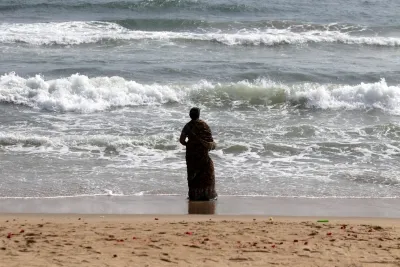Has TN Relaxed Rules for Coastal Aquifer Zones to Allow ‘White Industries’?

Synopsis
Key Takeaways
- Tamil Nadu has relaxed restrictions on aquifer recharge zones.
- New regulations allow for the establishment of low-pollution industries.
- Concerns about groundwater sustainability have been raised.
- 609 categories of industries are classified as ‘white’.
- The changes could impact Chennai’s water supply.
Chennai, Oct 15 (NationPress) The government of Tamil Nadu has revised its development regulations concerning critical aquifer recharge zones along the southern coast of Chennai. This amendment now permits the establishment of “white industries” in areas that were formerly limited to small-scale and cottage operations.
This change, announced via a recent Government Order from the Housing and Urban Development Department, signifies a notable transformation in land-use policy for one of the city’s most ecologically sensitive regions.
White industries are defined as those that have a minimal or no negative impact on the environment.
Previous regulations allowed only restricted, low-rise developments such as small residential buildings, consulting offices, petty shops, schools, hostels, and cottage industries employing up to eight workers using machinery below five horsepower.
The new guidelines broaden the permissible scope to incorporate low-pollution industries like bicycle assembly, bio-fertilizer and bio-pesticide production without inorganic chemicals, cotton and woollen hosiery manufacturing, light engineering and fabrication workshops, leather cutting and stitching, vehicle scrap collection centers, finished leather goods production, and used cooking oil collection facilities.
Official data indicates that there are 609 categories of industries classified as “white”.
The government has framed this initiative as part of its industrial facilitation agenda, aiming to promote environmentally compliant enterprises in appropriate zones. Nonetheless, experts have raised concerns that such an expansion in vulnerable aquifer regions could jeopardize Chennai’s groundwater sustainability, especially along the coastline, where saltwater intrusion is a constant problem.
Under the Tamil Nadu Combined Development and Building Rules, 2019, aquifer recharge areas—recognized for their significant groundwater potential—are classified as restricted zones for construction. These include coastal villages such as Kottivakkam, Palavakkam, Neelankarai, Okkiam Thuraipakkam, Injambakkam, Karapakkam, Sholinganallur, and Uthandi in south Chennai.
These zones are part of the city’s crucial groundwater recharge belt, serving as essential sources for its water supply.
Earlier in May this year, the state had already exempted white-category industries from securing mandatory clearances from the Tamil Nadu Pollution Control Board. Research by the Centre for Urbanisation, Buildings and Environment has revealed that the no-development zone between Thiruvanmiyur and Uthandi has shrunk by almost 250 acres since 2011, primarily due to construction and land-use alterations, further stressing the coastal aquifers that safeguard the city’s freshwater reserves.










